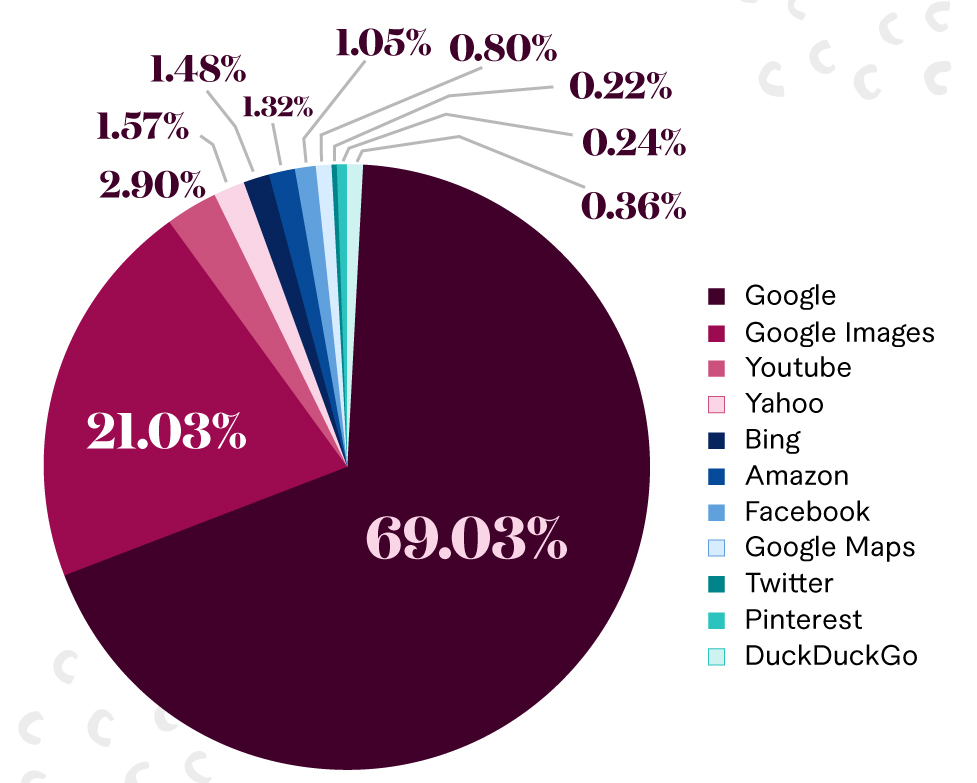When you think about a search engine, what comes to mind?
Probably Google.
Google is the world’s most popular search engine and the most popular website. So much so that in 2006 “Google” was officially recognized as a verb. Google also owns the second-largest search engine, YouTube.
Powerful, for sure.
But did you know there are alternatives to Google that you could be taking advantage of with your SEO?
Bing, Yahoo, and DuckDuckGo are some runner-ups that all have strengths for your content.
Don’t put all your eggs in one basket, as they say. Focusing on Google alone could make you miss out on other key traffic sources.
Here’s how to take advantage of alternative search engines:
1. Yahoo
Aside from Google, this is one of the better-known alternative search engines.
Did you know that Google tried to sell out to Yahoo for 1 million dollars when it was just a small company back in 1999? They refused the deal and later tried to acquire Google for $3 billion, but the tables were turned.
Still, Yahoo has been around for a long time and has a power of its own.
One advantage to Yahoo is when people go to the homepage to access news and their email accounts they have the search bar right there. Since 2009, Yahoo’s search power has come from Bing which we will talk about next.
Another potential advantage of the Yahoo search engine is that algorithms are not updated frequently as with Google. This makes it a lot easier to optimize your content and keep it optimized.
You can get a higher website ranking with Yahoo through:
- Researched and strategic keywords
- Page titles that match users’ searches
- Keeping relevant text and links in HTML not images
- Using ALT text for images also brings your relevant content up in search
- Cross-links that provide added value and meaning to your content
- URLs that represent the content of your pages
- Unhiding Javascript content for crawlers with non-script HTML elements
Just like with Google, Yahoo accepts site maps so you will also want to submit your site map with Yahoo’s SEO tools.
2. Bing
Bing powers Yahoo search so you can take advantage of both search engines with similar standards.
While Bing is a smaller search engine than Google it still has a good portion of the search engine market share. So, it’s worth looking at.
Microsoft created Bing, another big-name company, and has a dynamic algorithm. This algorithm requires you to cover multiple bases rather than focusing on one ranking factor. The Bing algorithm is a machine learning model and is big on cutting out spam.
As with any of the search engines, you want to make sure your content that comes up in search is relevant to what users are searching for. Think about not just keywords but user search intent.
If you create quality content and use the same SEO tips listed above under Yahoo, you can rank faster on Bing than you would with Google. This is due to lower SERP competition.
Google likes to be a bit secretive about how pages are actually ranked. Bing on the other hand lets you know through their webmaster guidelines.
You can submit your sitemap to Bing through their sitemap tools. Once you submit your sitemap, Bing will continue to crawl it regularly.
Bing best practices:
- Avoid duplicate or very similar content and keep your page numbers reasonable
- If you move anything on your site use appropriate redirects whether permanent or temporary
- Allow Bingbot to crawl deeply and frequently in the webmaster settings
- Use the Bing content removal tool for pages that present a 404 error
- Make sure your pages are thorough with useful content, not just ads and links
- Make all content unique including written and visual
Bing likes to rank quality content that is engaging but also fresh content. So, make sure you have a good content strategy in place to keep the content coming.
3. DuckDuckGo
Have you heard of this one?
DuckDuckGo is becoming a more popular search engine for its commitment to users’ privacy.
“DuckDuckGo had an estimated 70-100 million users as of June 2021. This estimate is based on market share estimates, download figures, and surveys.” Startup Bonsai
Unlike the other search engines, DuckDuckGo chooses not to collect customers’ data as they use the search engine. They use private search, tracking blocking, and site encryption. Already popular in the United States, DuckDuckGo is set to increase in market share. Especially as internet privacy becomes a bigger issue.
DuckDuckGo also does not store search history which can cut down on the retargeting ads users receive. The custom algorithm compiles results from other search engines, including Yahoo and Bing.
To optimize your content for DuckDuckGo you have to get a bit more specific since the search engine does prioritize privacy.
If you are a local business, you will want to add local keywords as users may not want to share location data. By prioritizing local SEO optimization users will still be able to find you, without sharing their location. Another way for searchers to find you locally is to claim your listing on Apple Maps.
DuckDuckGo uses a large variety of sources to get users results that focus on answers, not just links.
This platform also presents users with a very clean and minimal user interface that some love because it cuts down on distractions. Another advantage for users with private browsing is removing them from filters.
Many users claim DuckDuckGo is less intuitive than Google.
So, follow the same best practices but be more specific. Users of DuckDuckGo appreciate privacy and minimalism. Make sure your website presents a good user experience- easy navigation, minimal pop-ups, and interruptions.
What is the best alternative search engine?
Multiple search engines mean multiple opportunities to rank and get found online. Whatever search engines you choose to focus on, think about the user and how your content can add value to their lives. Search engines want content that is a win-win for everyone.
Get your content strategy on point
With our SEO content services, we can help you create data-driven content. For Google as well alternative search engines. So that your content can reach a wide audience and earn you organic traffic.







